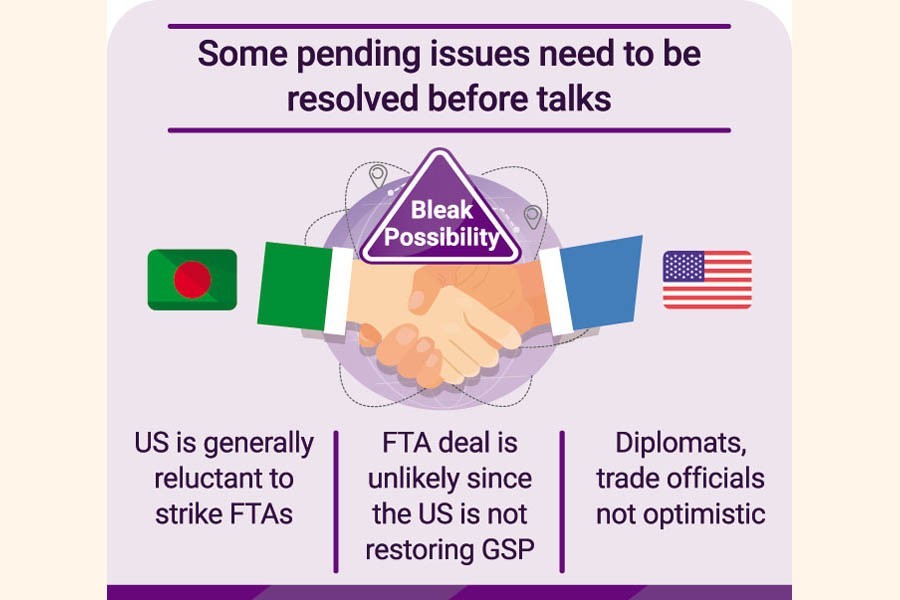Diplomats and trade officials see a bleak possibility of striking a free-trade area (FTA) agreement between Bangladesh and the United States as political and compliance issues may stand as deterrents.
They, in this context, pointed out that the US did not restore the generalised system of preferences (GSP) facility for Bangladeshi products on various considerations and those could again stand in the way of signing a free-trade pact.
Eager to sign a free-trade deal with the US, the ministry of commerce recently sought opinion of the Bangladesh embassy in Washington, D.C., on how the issue can be taken forward.
Ambassador M Shahidul Islam replied to commerce secretary Tapan Kanti Ghosh that the US is generally reluctant to strike FTAs and has so far concluded only 14 such deals covering 20 countries.
"It would also appear that most of these FTAs have been concluded on political rather than economic considerations," he wrote.
Mr Islam also wrote that tariffs may not be the main barrier to further growth of export to the US market for Bangladeshi products.
"Also, elimination of tariff may not automatically increase our exports to the US market since we have limited exportable commodities, excepting readymade garments," he noted.
The diplomat's note on export reflects a common view about the need for diversifying the country's export basket, more so for facing the challenges that would be evolving following Bangladesh's graduation from the poor-country club or LDCs.
Rather he feared that any move to sign an FTA deal with the US may only open another front of talk about Bangladesh's labour issues, intellectual-property rights and many other compliance requirements.
He recommended that the commerce ministry examine the possible advantages and disadvantages associated with the proposed FTA deal with America before going forward or placing a formal proposal.
Contacted Monday, commerce secretary Tapan Kanti Ghosh told the FE that Bangladesh is interested in having an FTA deal with the US but has yet to receive a response from the counterpart.
He said the Bangladesh embassy in Washington suggested raising the issue in the next meeting of the much-hyped trade and investment cooperation framework agreement (TICFA) to see the reaction of the US side.
"Some pending issues need to be resolved before moving forward for FTA talks with the US," Mr Ghosh said, referring to the ambassador as saying.
Another senior commerce ministry official said Bangladesh is unlikely to receive any positive signal from the US side if a proposal is made for signing an FTA deal.
Even if the US agrees to start talks, he added, Bangladesh would not be able to meet the rigorous conditions to be imposed by the world's biggest economy.
Research director at the Centre for Policy Dialogue (CPD) Dr Khondaker Golam Moazzem earlier told the FE the US suspended GSP facility mainly on labour-standard issue, which will remain a sticking point in case of any future deal.
"Since the US is not restoring the GSP on labour-rights concern, it also would not sign an FTA deal with Bangladesh leaving the issue unaddressed," he said in an inference drawn from the antecedent.
After the Rana Plaza collapse, Mr Moazzem noted, conditions on labour rights came only in case of the apparel and shrimp sectors. ""Even if the US agrees to sign FTA deal, now the labour-standard issues will be applicable to all sectors."
When the US signs an FTA deal, it not only considers trade, it also assesses investment, public procurement, intellectual-property rights, and governance among other standards.
"We will face big challenges in this case because the practices we follow are not compatible with such deals," Mr Moazzem added.


